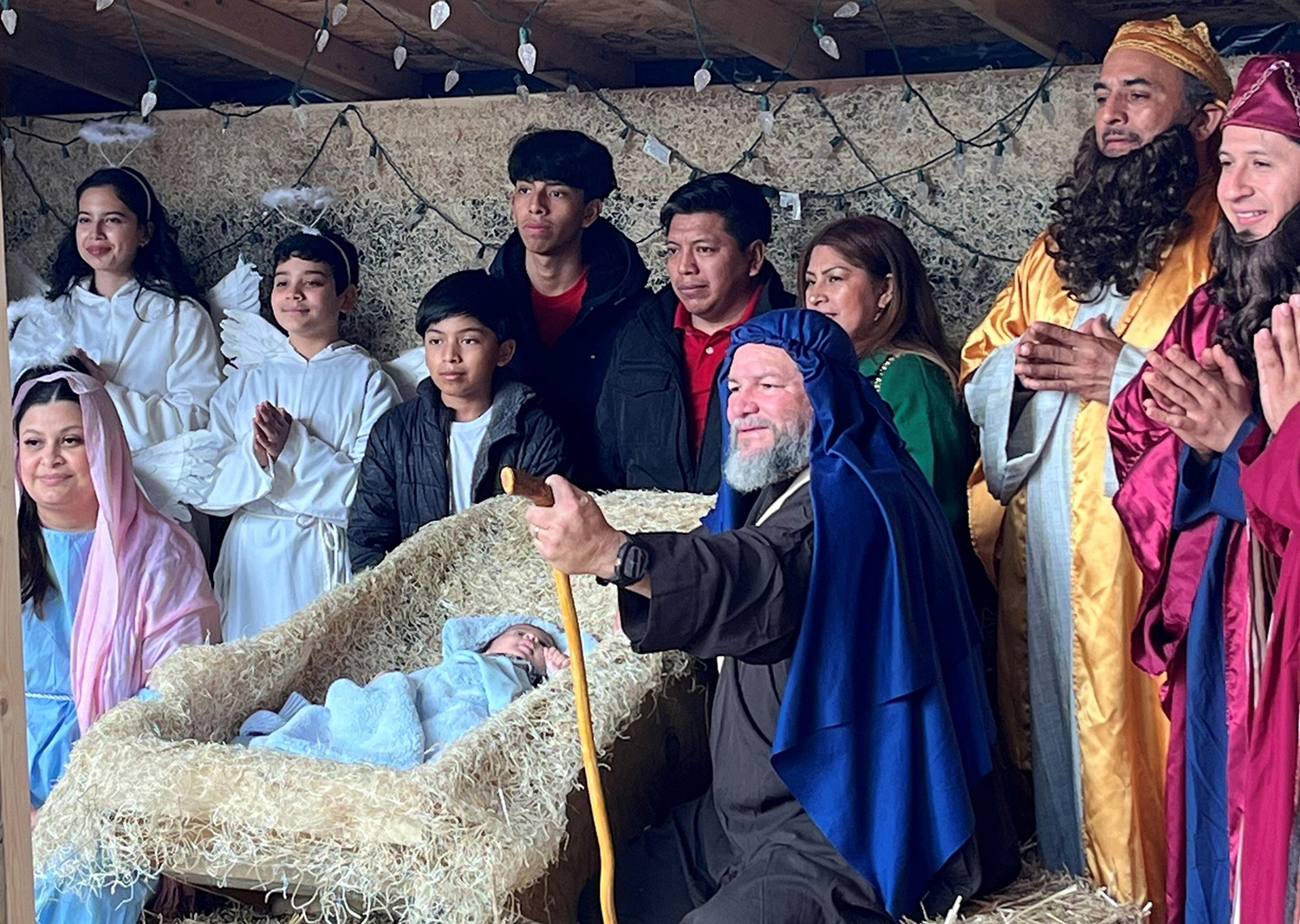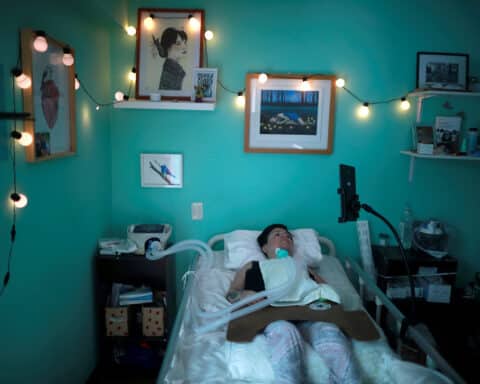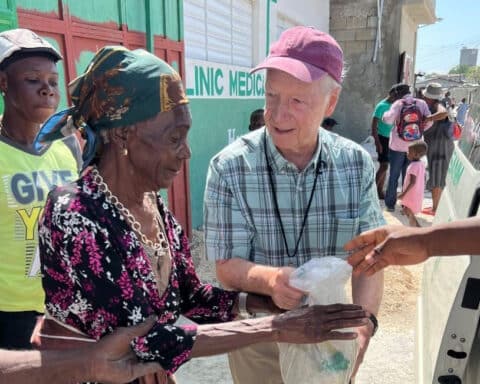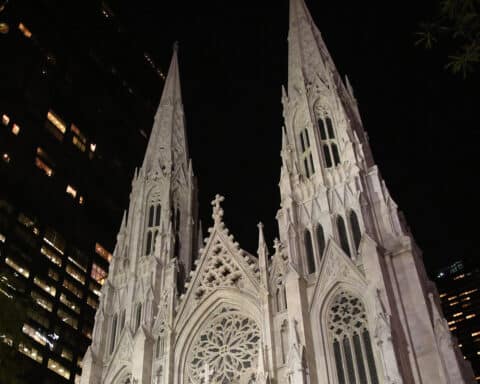SILVER SPRING, Md. (OSV News) — The Nativity — the gift of Jesus to the world on Christmas — was brought to life in a poignant way Dec. 24 during a living Nativity outside St. Camillus Church in Silver Spring.
The living Nativity on Christmas Eve was held on the exact day of the 800th anniversary of when, according to tradition, St. Francis of Assisi made the first Nativity scene in a cave in the village of Greccio, Italy, on Dec. 24, 1223, as a reminder of the humble birth of Jesus in a manger in Bethlehem.
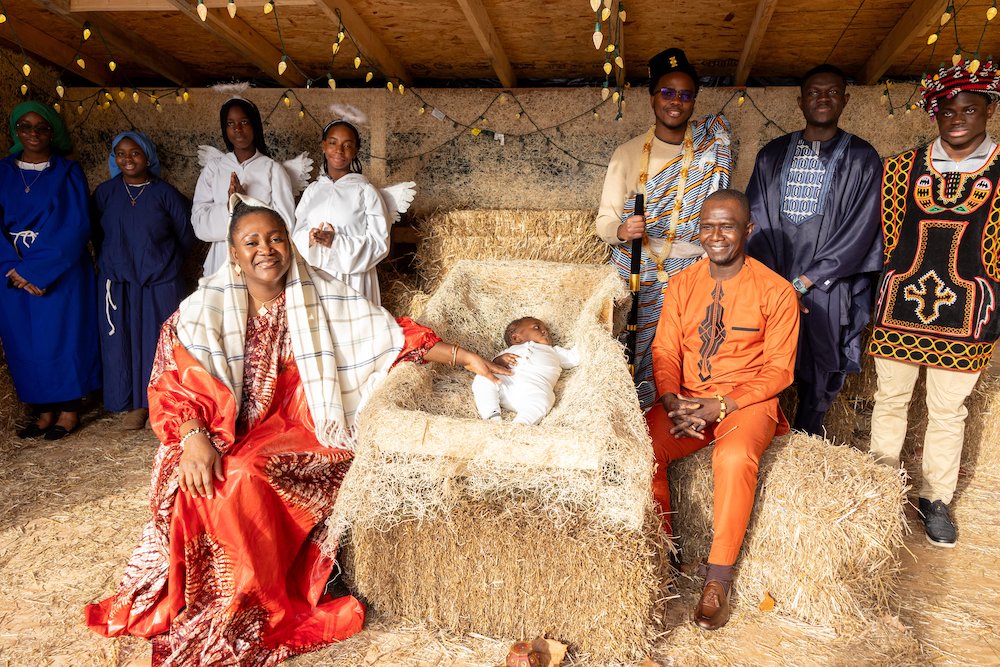
During the afternoon of Dec. 24 in the Washington Archdiocese, five groups of St. Camillus parishioners, representing the different cultural backgrounds in the parish, took turns in portraying the Holy Family. They were joined by people portraying angels, shepherds and three Magi in a manger built by parishioners, as choirs from those communities sang Christmas songs in their native languages.
And just as St. Francis had live animals at his Nativity scene, outside St. Camillus Church was a fenced-in area filled with hay in front of the manger, with a donkey, two sheep, a Miniature Zebu cow and two goats from the Bar C Ranch in Perryville, Virginia.
A Franciscan tradition
“The living Nativity presents that Jesus was born in poverty and humility,” said Franciscan Father Brian Jordan, pastor of St. Camillus Parish. “He was born in a simple manger, no room in the inn. We’re finding room for Jesus in our hearts and minds and souls through this living Nativity.”
At one point in the afternoon, a choir sang Christmas songs in Spanish, when in a procession, Hispanic members of St. Camillus Parish portraying the people and angels in the Nativity story walked to the manger.
Father Jordan, a native New Yorker, announced in a loud voice that the three kings had come from Africa, Asia and Brooklyn, New York. Maria De Jesus Molina from El Salvador portrayed Mary, and she carried her 3-month-old son, Ezra, who portrayed baby Jesus, and walking beside them was her uncle, Edwin Molina, who portrayed Joseph.
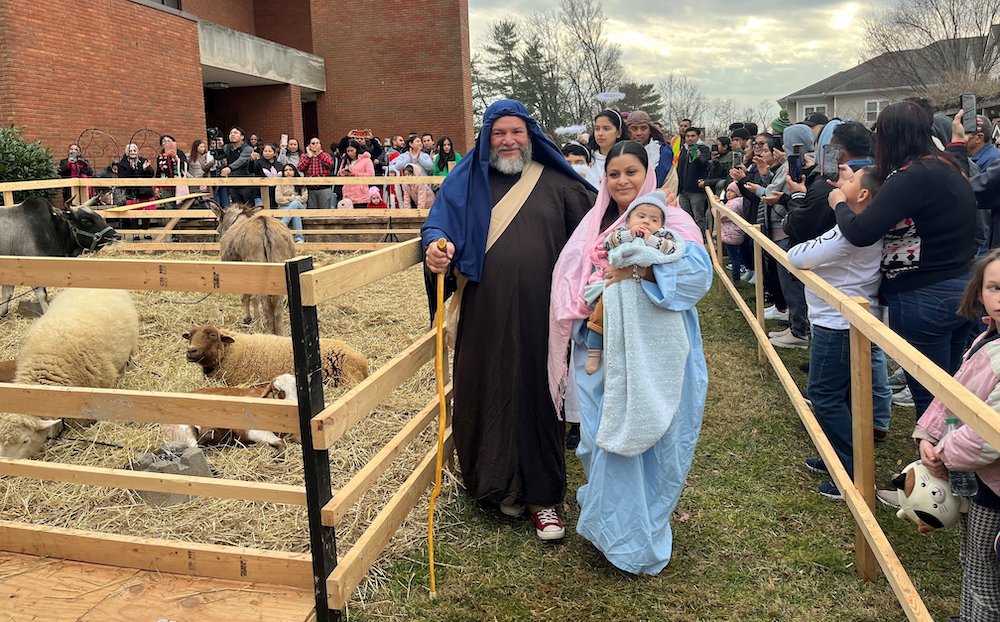
Parishioners were invited to come forward and have their photos taken with the Holy Family, angels, shepherds and Magi, while people crowded along the fence where the animals quietly rested and chewed on hay. The crowd of onlookers included guests from other parishes.
A diverse parish participates in the Nativity
Each weekend, St. Camillus has two Masses in Spanish at its church, and two more Masses in Spanish at its Langley Park Mission. The parish also has a Mass on Sunday afternoons in French for parishioners with roots in Africa, an intercultural Mass on Sunday mornings, and regular Masses in Bangla for parishioners from Bangladesh.
As the living Nativity was staged that afternoon in front of the church, two groups of Hispanic parishioners, and parishioners from Africa, Bangladesh and from European ancestry portrayed the Holy Family and other figures from the Nativity story.
Later, Maria De Jesus Molina in an interview noted, “My name is Mary of Jesus. I was born on Dec. 25.” Considering her name and her birthday on Christmas day, she said it was “pretty nice” to portray Mary, and for her baby to portray Jesus. “He’s a good baby,” she said as she held her little boy.
After their portrayal of the Holy Family, the next group of reenactors of the Nativity story represented the parish’s various African communities. These parishioners portraying the Holy Family included Emma Lendi from the Ivory Coast and her husband, John Lendi from Togo, who portrayed Mary and Joseph, along with their 8-month-old son, Yohann, who portrayed baby Jesus.
“It’s an honor for us to be part of this community, representing Africa,” said John Lendi, who described it as a heartfelt experience. “It’s a grace,” his wife added in an interview with the Catholic Standard, newspaper of the Archdiocese of Washington.
The next group of parishioners depicting the Holy Family and other Nativity figures included Linda Costa, Lincoln Rozario and their daughter Gianna Rozario, portraying Mary, Joseph and baby Jesus and representing the parish’s Bangladeshi Catholic community, while a choir sang Christmas songs in Bangla.
As those parishioners walked forward to the manger, Father Jordan said, “Christ Jesus is among us … (and) loves us all.”
Thinking of the Holy Land
In an interview earlier that afternoon, the Franciscan priest noted that like today, there was tension in the Holy Land at the time Jesus was born. The living Nativity at St. Camillus unfolded as Israel waged war in Gaza following a brutal terror attack by Hamas militants on Oct. 7 that killed more than 1,200 Israelis and where more than 250 people were taken hostage. Israeli has responded with a military assault and heavy bombing in Gaza that has reportedly resulted in more than 20,000 deaths, including many civilians and children.
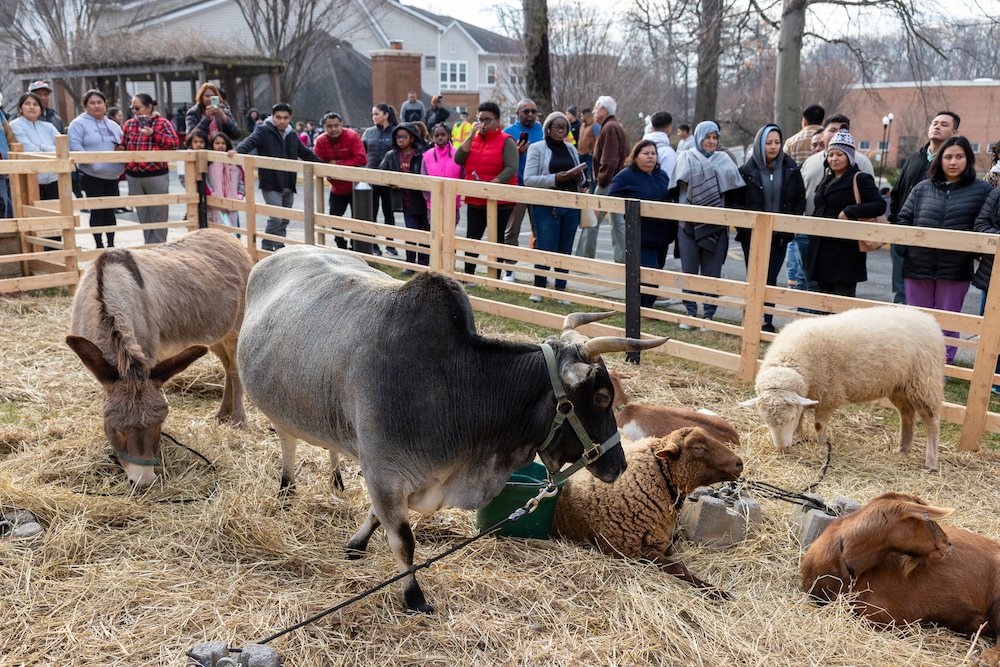
“We are praying the message of the Prince of Peace comes alive again,” Father Jordan said. He added that since St. Francis of Assisi is the patron saint of ecology, “We not only pray for peace, but that world leaders open their hearts and minds to (the impact) of climate change.”
Reflecting on how the living Nativity was taking place on the 800th anniversary of when St. Francis is believed to have set up the first Nativity scene, Franciscan Father John Heffernan, a parochial vicar at St. Camillus, said, “It’s a demonstration of how personal it was to Francis.
Francis had a very lively connection to Jesus. This event was for him, something nourishing.”
As parishioners from different backgrounds gathered around the living Nativity, the Franciscan priest said, “They know this parish is a welcoming home in a very personal way.”
Inspired by the living Nativity
And like the founder of his religious order, Father Heffernan was very moved by the living Nativity. The priest noted, “The sweetness of it fills us with joy and gives us an insight today, as different as the world is, that the Lord still comes.”
Alfredo Terrazas from St. Camillus Parish, who attended the living Nativity with his three daughters, said it offered a reminder of how the Nativity story can inspire people to seek “a new start” in their lives.
“Hope is born in this time,” he said.
His daughter Gabby Ayala Terrazas, an eighth grader at Harbour School in Annapolis, Maryland, said, “I feel like I’m going back in time.” Her sister Yankarla Ayala Terrazas, a sixth grader at Stone Ridge School of the Sacred Heart in Bethesda, said, “For me, it means being connected to the church and everyone here… (and) the joy of being together.”
Another daughter, Ruth Ayala Terrazas, a junior at Stone Ridge said seeing the animals highlighted God’s creation.
“It’s been a crazy last two years,” she said, referring to the impact of the COVID-19 pandemic on people’s lives, and she contrasted that with that day’s joyful gathering. “Seeing the baby smile, it gives us a sense of hope,” she said.
Mark Zimmermann is editor of the Catholic Standard, newspaper of the Archdiocese of Washington.

